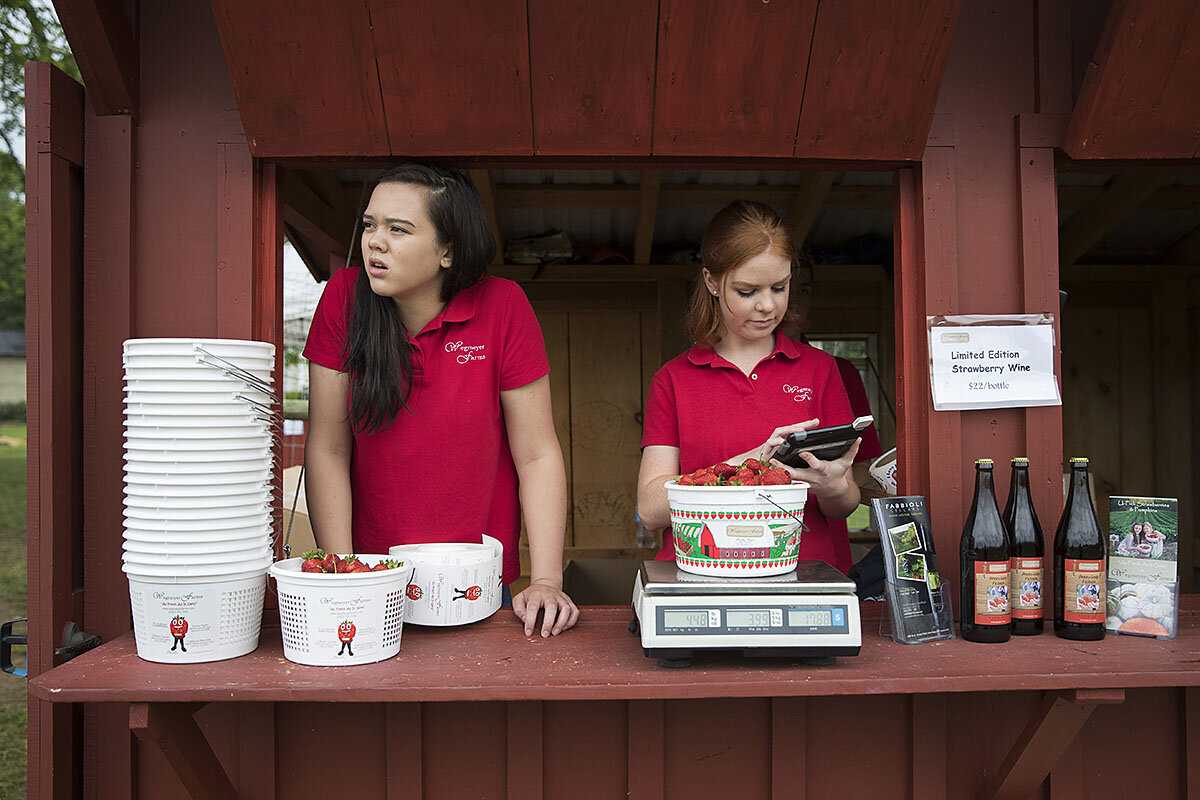After her parents were deported to Haiti when she was eight, Sherley Muscade lived with a family friend in the United States and, eventually, her aunt. She shifted schools often. She babysat during the summers. And then last year, she had her best summer ever: a job at the Boston Planning and Development Agency.
“I was absolutely meant to be there,” says Ms. Muscade, now a high school graduate. “I learned so much. At meetings, I was treated as a coworker rather than a lowly intern.”
She loved it so much she went back to work at the redevelopment agency this summer. And she's been accepted to enter Georgetown University this fall.
Muscade's experience is increasingly rare, however. At a time when most teens are busy burnishing their college résumés with unpaid internships, summer courses, and volunteer gigs, the onetime rite of passage – the summer job – has lost much of its luster. Two generations ago, a majority of teens worked in the summer; now it’s only about 3 in 10.
But for teens who need them, summer jobs are more important than ever even as they've become all too scarce. Recent research finds the work opportunities reduce crime and offer disadvantaged youths the experience and job connections that can help them in later years.
“There's nothing quite like being paid to work for someone; I call it the habits of paid work,” says Neil Sullivan, executive director of the Boston Private Industry Council, which coordinates the city’s summer jobs program for disadvantaged youths. The decline in summer jobs, he says, represents "the collapse of America's workforce training system for teenagers…. It’s like an earthquake in the labor market, and teens fell through and nobody noticed.”
The effect of a generation of twenty-somethings entering the workforce with little or no previous work experience is not yet known. Will they quickly pick up those basic job habits – being on time, dressing appropriately, treating customers with courtesy – that their parents learned early on waiting tables and manning shop counters?
“I worry most about the noncollege-bound kids,” says Alicia Sasser Modestino, a Northeastern University professor who has studied Boston’s summer employment program. “They're growing up in neighborhoods where there’s a lack of job opportunities.”
Despite a booming economy, summer jobs are in surprisingly short supply. The unemployment rate for 16- to 19-year-olds stood at 13.3 percent in June, three times the rate for the population as a whole.
The problem is especially acute among teens from low-income families, according to the Center for Labor Markets and Policy at Drexel University in Philadelphia. Only 20 percent of teens from families earning less than $20,000 a year are likely to have summer jobs, compared with about 40 percent from families earning more than $100,000.
Those disadvantaged young people who do get jobs – often through the help of big-city youth programs – can reap rewards that aren’t always obvious. There’s the income, of course. There's learning vital work habits and skills.
A summer job also provides a tangible pathway where teens can envision a future of employment, as well as links to adults who can provide guidance and job recommendations, professor Modestino says. Her surveys ask teens before and after their summer job whether they have a role model. “We find big improvements over the summer, especially for the males and particularly for the black and Hispanic males,” she says.
There are other benefits. Older high schoolers with poor attendance also spend more time in class after their summer jobs, according to a 2014 study of New York City’s program.
Summer jobs lower the crime rate – and not because they keep kids off the street. A 2014 study of disadvantaged high schoolers in Chicago found that a summer jobs program reduced violent crime arrests (among those who had the jobs) by 43 percent over 16 months. Most of the drop occurred after – not during – the eight-week jobs program.
Modestino found a similar crime-reducing effect in Boston. One clue as to why: When asked what they had learned from the summer jobs program, more than 40 percent of the Boston youths “agreed strongly” that they had learned how to manage their emotions and temper, how to ask for help, and how to resolve peer conflicts constructively.
There are many factors behind the decline in teen jobs. Part of it involves losses of middle-class jobs, which have forced many adults to take the entry-level sales and service positions that teenagers used to hold. Seniors also are increasingly taking part-time jobs as a supplement to retirement income. Additionally, a major provider of those entry level positions is shrinking: department store jobs are down 28 percent from their peak in 2001.
Increasingly, too, teens are showing more interest in preparing for college than holding a job. They’re pursuing unpaid internships, doing volunteer work that might attract the attention of admissions officers, or studying during the summer. In 1985, 10 percent of teens were enrolled in school in July, the BLS found. Last year, the share had risen to 42 percent.
“It's become two separate worlds,” says Paul Harrington, director of the Center for Labor Markets and Policy at Drexel University in Philadelphia. “You have more kids who have never worked. They've never worked!... They don't know how to function in a job market.”
Then there’s Muscade, the high school graduate who worked at the Boston redevelopment agency. “I do think it helped,” she says of her work experience. “Now, my boss is my cheerleader.”
For her college application to Georgetown, she wrote about her work experience. “My aspiration,” she adds, “is to be an immigration lawyer.”






